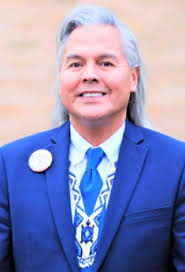SAULT STE. MARIE, Mich.— Former National Congress of American Indians First Vice President Aaron Payment is making a comeback onto his tribal council.

Two years ago, the Sault Ste. Marie Tribe of Chippewa Indians Chairperson resigned from office following pressure exercised by a political faction of the tribal council. One month later, one hundred percent of the incumbents who voted on censuring Payment, lost their seats.
On Thursday, the voters of the Sault Ste. Marie Tribe voted to put Dr. Payment on top the primary election for Tribal Council with 1326 votes cast followed by his running mate Betty Freiheit at 1239.
“It is heartening and I am humbled to receive a vote of confidence by placing me in the top spot in the Unit 1 primary. I have work left to do and with the Sault Tribe voter’s continued support, we can get back to work and help Chairman Lowes return our Tribe to a position of National respect and prominence,” Payment told Native News Online.
Additionally, Chairperson Austin Lowes, the special advisory winner for Chairperson in 2022 received twice as many votes in his re-election bid as his opponents combined at 53% (3811 votes).
“I would like to take this moment to say chi miigwetch to everyone who supported me during the primary election. We earned more than 2X as many votes as the other Chair candidates combined. General election ballots will be mailed within the next two weeks, and I would be honored to receive your vote to build on the progress we’ve made as a Tribe.” Lowes said.
Former Chairperson Payment figured prominently in service to Indian Country as former 1st VP of NCAI, Co-Chair of the HHS Secretary Tribal Advisory, and Midwest Co-Chair of the Tribal Interior Budget Council. Payment also had the honor of presenting the Indian Country appropriations request to the Senate Committee on Indian Affairs three legislative cycles in a row and worked for the National Indian Health Board to secure Advanced Appropriations for the Indian Health Service.

Lowes was not present for the counting of the tribal. Instead he was at the White House at the State Dinner for the Kenya President William Ruto at the invitation this past week of President Joe Biden. The guest list included former Presidents Bill Clinton and Barack Obama and actor Sean Penn.
More Stories Like This
Native News Weekly (August 25, 2024): D.C. BriefsUS Presidents in Their Own Words Concerning American Indians
Federal Judge Orders ICE to Halt Use of Pepper Spray, Arrests of Peaceful Protesters in Twin Cities
Tunica-Biloxi Cultural Leader John D. Barbry Walks On
Next on Native Bidaské: Federal ICE Activity in Minneapolis: Ruth Buffalo’s Perspective
Help us defend tribal sovereignty.
At Native News Online, our mission is rooted in telling the stories that strengthen sovereignty and uplift Indigenous voices — not just at year’s end, but every single day.
Because of your generosity last year, we were able to keep our reporters on the ground in tribal communities, at national gatherings and in the halls of Congress — covering the issues that matter most to Indian Country: sovereignty, culture, education, health and economic opportunity.
That support sustained us through a tough year in 2025. Now, as we look to the year ahead, we need your help right now to ensure warrior journalism remains strong — reporting that defends tribal sovereignty, amplifies Native truth, and holds power accountable.
 The stakes couldn't be higher. Your support keeps Native voices heard, Native stories told and Native sovereignty defended.
The stakes couldn't be higher. Your support keeps Native voices heard, Native stories told and Native sovereignty defended.
Stand with Warrior Journalism today.
Levi Rickert (Potawatomi), Editor & Publisher


